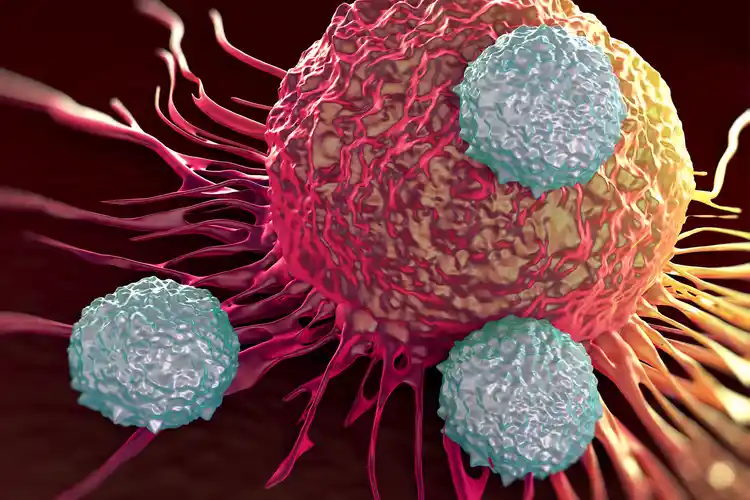Where Breast Cancer Treatment Is Heading

Hide Video Transcript
Video Transcript
[MUSIC PLAYING]
And so over the last 40 years, researchers have discovered various types of breast cancer. There's different subtypes, different receptors, prognostic features, unique mutations. And it's gotten a lot more complicated. But the good news is that means treatment is now personalized and no longer a one-size-fits-all approach.
There are a lot of exciting treatments on the horizon. We're now able to analyze our patients' DNA and their cancer's DNA to figure out where the mutation happened. And once we run that molecular testing, then we can recommend a drug that specifically targets that mutation. And we call that targeted therapy.
Immunotherapy is also becoming an option for early-stage triple-negative breast cancer. And this type of therapy is what retrains your immune system to help in the fight against breast cancer.
I have a feeling that surgery, chemo, and radiation, they're always going to have a place in specific circumstances. But we are moving away from those older therapies. For example, from a surgical perspective, we're now able to offer breast conservation surgery when previously, all we were able to offer were these radical mastectomies that involved removing parts of the chest wall.
And those surgeries were really morbid. And nowadays, we've realized that we can get similar patient outcomes with less aggressive surgeries.
And similarly, from a chemotherapy standpoint, we now have a tool called Oncotype which is a genomic test that can be run on specifically early-stage receptor-positive breast cancers. And it helps guide our decision-making by looking at the biology of each patient's tumor and giving us an accurate prediction for chemotherapy benefit, if any at all. And we didn't have that option 10 years ago.
The goal for treatment for breast cancer really depends on each person. If someone presents with an early-stage breast cancer, which means that the cancer cells haven't spread outside the breast or the axillary lymph node, then our goal is curative. We're now curing over 85% of stage I through III breast cancers.
And for stage IV or metastatic breast cancer, meaning the cancer cells have spread outside the breast or the lymph node, our goal is a balance between quality of life and extending life duration by as much as possible.
So nowadays, stage IV breast cancer patients are living a lot longer since the advancements have been made in molecular profiling. We're not up front recommending chemotherapy for these patients. We're now able to use antiestrogen and targeted therapy to give them years more life than we previously could.
VICTORIA RIZK
Historically, breast cancer treatment is primarily composed of surgery, radiation, and some form of systemic therapy, and whether that can be chemotherapy, antiestrogen therapy, or targeted therapy. But in order to understand these effective treatments, you have to understand that there's diversity within breast cancer. And so over the last 40 years, researchers have discovered various types of breast cancer. There's different subtypes, different receptors, prognostic features, unique mutations. And it's gotten a lot more complicated. But the good news is that means treatment is now personalized and no longer a one-size-fits-all approach.
There are a lot of exciting treatments on the horizon. We're now able to analyze our patients' DNA and their cancer's DNA to figure out where the mutation happened. And once we run that molecular testing, then we can recommend a drug that specifically targets that mutation. And we call that targeted therapy.
Immunotherapy is also becoming an option for early-stage triple-negative breast cancer. And this type of therapy is what retrains your immune system to help in the fight against breast cancer.
I have a feeling that surgery, chemo, and radiation, they're always going to have a place in specific circumstances. But we are moving away from those older therapies. For example, from a surgical perspective, we're now able to offer breast conservation surgery when previously, all we were able to offer were these radical mastectomies that involved removing parts of the chest wall.
And those surgeries were really morbid. And nowadays, we've realized that we can get similar patient outcomes with less aggressive surgeries.
And similarly, from a chemotherapy standpoint, we now have a tool called Oncotype which is a genomic test that can be run on specifically early-stage receptor-positive breast cancers. And it helps guide our decision-making by looking at the biology of each patient's tumor and giving us an accurate prediction for chemotherapy benefit, if any at all. And we didn't have that option 10 years ago.
The goal for treatment for breast cancer really depends on each person. If someone presents with an early-stage breast cancer, which means that the cancer cells haven't spread outside the breast or the axillary lymph node, then our goal is curative. We're now curing over 85% of stage I through III breast cancers.
And for stage IV or metastatic breast cancer, meaning the cancer cells have spread outside the breast or the lymph node, our goal is a balance between quality of life and extending life duration by as much as possible.
So nowadays, stage IV breast cancer patients are living a lot longer since the advancements have been made in molecular profiling. We're not up front recommending chemotherapy for these patients. We're now able to use antiestrogen and targeted therapy to give them years more life than we previously could.
